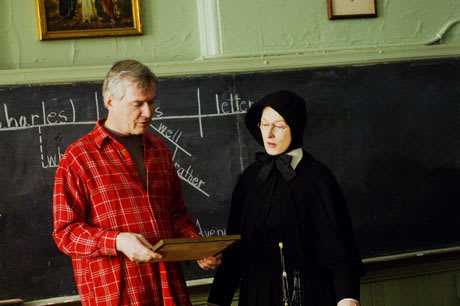Doubt is a bit of a critic's nightmare, for as Amy Adams accurately puts it in an interview with the cast, "[Doubt] is not about what I [the critic] think; it's about what you think." This is the central premise of John Patrick Shanley's Pulitzer Prize-winning play, which he has skilfully adapted for the screen. It plants the seeds of doubt in the mind of the viewer and lets them fester and grow instead of handing us the answer. And this is precisely what makes the film so engaging. Sister James, (Amy Adams), a naive young nun working at a school in the Bronx, believes that she has witnessed some misconduct between the school priest (Phillip Seymour Hoffman) and troubled student Donald Miller. She divulges her worries to her superior, staunch traditionalist Sister Aloysius (Meryl Streep), who already holds a grudge against Father Flynn. Sister Aloysius pounces on this perceived paedophilia like a traffic warden on an illegally parked vehicle, convinced in her own mind of Father Flynn's guilt. Doubt is expertly adapted and deftly directed, pulling the audience into the conspiracy but never pointing us in any particular direction. What makes Doubt stand out is that the protagonist and antagonists of the story will appear different depending on the person watching. In the end, it is up to the audience to decide who they doubt. This is often a virtue of theatre that film lacks: the audience is challenged and driven to think analytically as well as emotionally. And because of his experience in both mediums, Shanley is able to keep the story relatively ambiguous. This isn't to say that the film takes no point of view, as every element, from the performances to the cinematography, is directional and assured. Streep, Hoffman and Adams each deliver controlled yet mutedly fervent performances that will make you side with each of them at different moments. The special features include a short documentary on the challenges faced by everyone when adapting the play for the screen, as well as an interview with the original sisters who ran the school. Both give interesting insights into the lives of the nuns and the challenges faced in the making of the film. There is also an interview with Streep, Adams, Hoffman and Davis, discussing the themes of the film and the challenges of portraying these characters. A short interview with the composer gives meagre insight into the scoring of the film but the special features are complementary and interesting, if a little paltry.
(Maple)Doubt
John Patrick Shanley

BY Madeleine Sims-FewerPublished Apr 15, 2009



